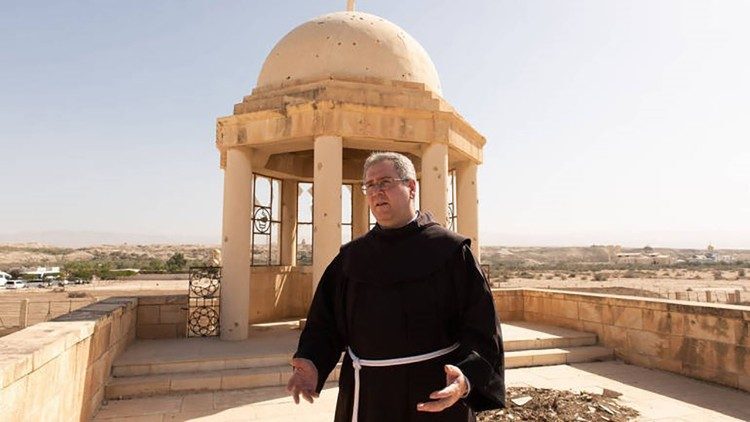Negotiation is possible
He noted that the agreement shows that “a path other than that of weapons” is possible “if there is the will to do so.” The release of hostages and prisoners, he said, is a first step that should pave the way toward a wider political solution to the Israeli-Palestinian conflict based on the “mutual acceptance of the right to exist of both Israel and Palestine.”
The Italian-born Franciscan friar went on to note that in the dramatic context of this conflict, the humanitarian aspect is fundamental.
Without the comforting and consoling humanitarian voice, he said, we cannot move forward because everything is reduced “to calculation, to a balance of interests, and to the use of violence.”
Christians can be a bridge
Asked about the role local Christians can play, Father Patton said they represent “a bridge” between Israelis and Palestinians, because they belong to both communities. “We have Christians in Israel, in Gaza, in the West Bank,” he said, saying this why they can have a “significant albeit limited role.”
The Holy Land needs a leaven that makes the voice of conscience grow both in Israeli and Palestinian society, which need authoritative voices “not only among Christians but also among Muslims capable of proposing a path not only of moderation but of reconciliation,” said the Custos. underscoring that this applies to both sides.
Fr. Patton acknowledged that it’s still early to speak about reconciliation in this highly emotional moment. However, he said, once this phase is over, people may be able to reason in a different way.
The Custos insisted that the important thing at the moment is that the truce holds, that the hostages are released, that the lives of civilians in Gaza too are safeguarded, and that the pause allows the various influential international actors in the region to continue to work so as to move from a truce to an armistice.
Right to existence of both peoples
Then the international community must find “a political solution,” otherwise “the same situation” will arise again in the future, he warned.
Fr. Patton noted that the war has once again brought to the fore “the underlying problem” of the unresolved Palestinian question, which is closely linked to the Israeli question.
Both people have suffered greatly throughout history, and this should lead them “to the recognition of their mutual suffering, remarked the Custos, recalling the words of Rachel Goldberg, the representative of the families of the hostages. In a recent interview with L’ Osservatore Romano, she said, “We must learn to recognize their suffering and they must learn to recognize our suffering.”
Only in this way, said Fr. Patton, can the region move forward. Instead, focusing on one’s side suffering will only lead to “further hardening.”
The role of the international community
In conclusion, Fr. Patton stressed the need for “external support” from the international community, that is, the United Nations, but also world and regional powers backing one or the other side.
This, he said, would have to be a process of “progressive accompaniment” that includes a transition phase, in which both Israeli and Palestinian political leaders will have to change their approach.
Growing pressure for a truce extention
Meanwhile, as the truce comes to an end, international pressure to roll over the deal is growing. UN Secretary-General Antonio Guterres pushed on Monday for a full humanitarian ceasefire between Israel and Palestinian militant Hamas instead of a temporary truce, as the “humanitarian catastrophe in Gaza is getting worse by the day.”
“The dialogue that led to the agreement must continue, resulting in a full humanitarian ceasefire, for the benefit of the people of Gaza, Israel, and the wider region,” Mr. Guterres’ spokesman Stephane Dujarric said in a statement. “The United Nations will continue to support these efforts in every possible way,” he said.
By Amedeo Lomonaco and Lisa Zengarini






